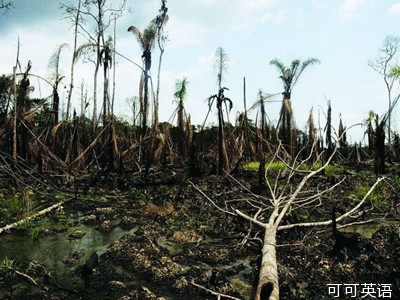Climate change is already melting the Arctic, queering weather and threatening food supplies. So who's paying the price for all these global warming impacts?
南極圈正因氣候變暖在融化,天氣變得異常,食物供應(yīng)也受到威脅。那么誰會(huì)為氣候變化的影響付出代價(jià)呢?
It might seem like insurers are most at risk. Indeed, insurers did pay out some $33 billion in climate-related damages last year in the U.S. alone.
看起來保險(xiǎn)公司的風(fēng)險(xiǎn)最大。事實(shí)上,去年僅在美國保險(xiǎn)公司就賠償了330億美元與氣候有關(guān)的損失。

But it turns out that bearing the brunt of climate change costs is you, the taxpayer.
然而事實(shí)證明,是你,納稅人才是首當(dāng)其中要付出代價(jià)的人。
A new analysis by the Natural Resources Defense Council, the NRDC, finds that the federal government spent three times more than the private insurance industry on climate change impacts last year. And, of course, those federal efforts are entirely funded by taxpayers.
一項(xiàng)來自美國天然資源保護(hù)委員會(huì)氣候中心的新研究發(fā)現(xiàn),聯(lián)邦政府去年在氣候變化影響方面的支出是私有保險(xiǎn)公司的三倍。當(dāng)然,聯(lián)邦政府的收入全來自于納稅人。
“It is in effect a climate disruption tax, equivalent to a 2.7 percentage point increase in what Americans paid in sales taxes last year.” That's Daniel Lashof, director of the NRDC's Climate and Clean Air Program and co-author of the report.
自然資源保護(hù)委員會(huì)氣候和清潔空氣項(xiàng)目的主任兼本報(bào)告的合著者丹尼爾·拉肖夫說道:“實(shí)際上這是一種氣候破壞稅收,相當(dāng)于多向美國人征收2.7個(gè)百分點(diǎn)的消費(fèi)稅。”
We spent nearly $100 billion in 2012 on drought-related crop insurance, storms like Hurricane Sandy, floods and wildfires. By comparison the nation spent $95 billion on education last year and just $91 billion on transportation.
2012年我們花了將近1000億美金來來支付旱災(zāi)作物保險(xiǎn),以及像颶風(fēng)桑迪這樣的風(fēng)暴、洪水以及森林大火造成的損失。比較之下,在教育方面的經(jīng)費(fèi)只有950億美元,在交通方面的支出也只有910億美元。
Greenhouse gas pollution shows no signs of slowing, recently touching 400 parts-per-million. And as that number continues to rise, so will the price.
溫室氣體污染沒有顯示出放緩的跡象,近期濃度已經(jīng)接近百分之400。隨著這個(gè)數(shù)字的上升,代價(jià)也在加大。
原文譯文屬可可原創(chuàng),未經(jīng)允許請(qǐng)勿轉(zhuǎn)載!












